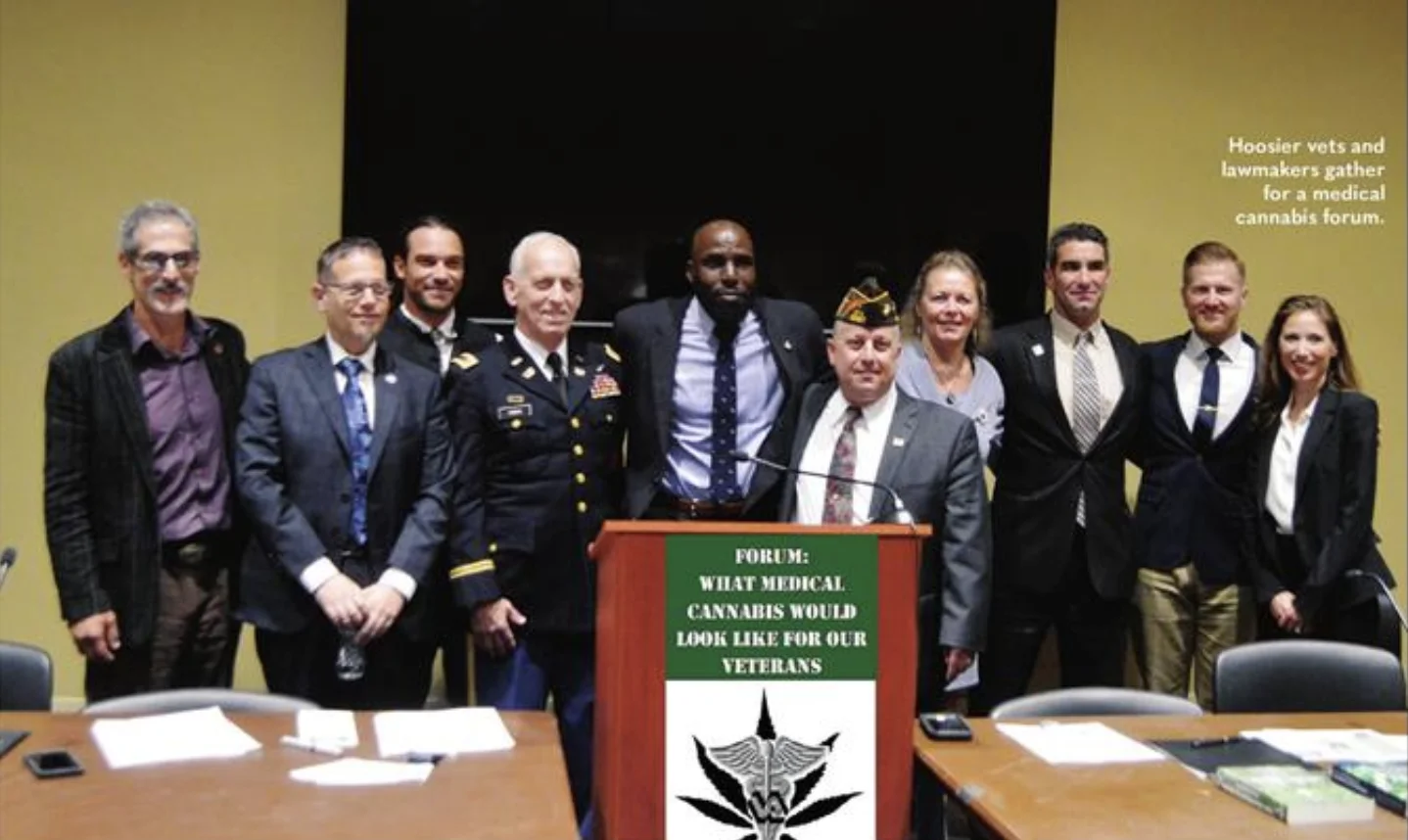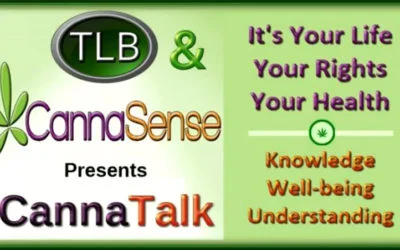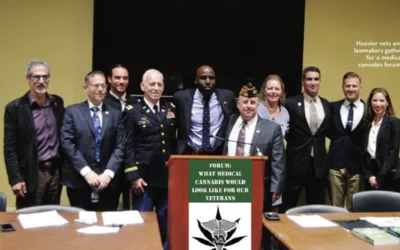
This article originally appeared in High Times // JANUARY // FEBRUARY 2021
Jeff Staker of Hoosier Veterans for Medical Cannabis is upending Indiana’s outdated approach to marijuana.
We’re traveling to the Midwest to visit Indiana, a state that only permits CBD oil. You read that right—there are still states in the United States that lack the decriminalization of either medical or recreational cannabis. Jeff Staker, the founder of Hoosier Veterans for Medical Cannabis, is a badass, to say the least. He served as a US Marine Corps scout sniper for 11 years, which required him to attend what is considered to be one of the most difficult military schools in the world. Then, for the past 22 years, he worked as a member of the Department of Defense security police and retired as a DoD civilian firefighter in 2018. Through the Veterans of Foreign Wars, the American Legion and Disabled American Veterans, Staker has been a champion fighting for veterans’ rights across the board.
With Hoosiers Veterans for Medical Cannabis, Staker educates veterans who are making the transition from active duty to civilian life. He’s a dedicated activist who devotes himself to suicide prevention and helping veterans combat opioid addiction by educating them about medical cannabis. Staker himself found medical cannabis in 2018, and has since then brazenly contacted his local prosecutor and notified him that he would be using cannabis to heal.
What has held Indiana back as one of the last remaining states yet to legalize medical cannabis?
I believe ignorance is the main contributing factor, especially among a majority of our state legislators and our governor, that is why Indiana has not legalized medical cannabis beyond that of CBD with a THC level of 0.03 percent or less. You see, in 2016 our Indiana legislators were proposing legislation that coincides with the federal CARA [Comprehensive Addiction and Recovery] Act of 2016, which put limits or cut off how opiates were to be prescribed, and that’s where the problem lies. Fortunately, I saw how this was failing through the Veterans Affairs (VA) system just prior to our state’s enactment of bills that were going to try and curb this devastating overdose epidemic we were facing here in the Hoosier State. I noticed that when the VA was limiting or cutting veterans off of their pain medication, like myself for years, veterans were still dying, even more so, either by overdosing on their medication or in a few cases how they were dying from the shock of being abruptly cut off cold turkey, or when cut off they would turn to harder street drugs like heroin and overdosing nonetheless. Finally, and with great sadness, I could see how veterans were coming to wit’s end and choosing to take their own life because they felt that they were in a losing battle and had no other choice unless there was a beneficial alternative like medical cannabis, which without a doubt provides a safer way to heal. In other states that have medical cannabis laws in place, you can actually see a reduction in the overdose rate on an average of 25 percent—some more, some less, but that average was good enough ammo for me to start fighting in this battle.
When medical cannabis is not offered in a state, how do veterans and other patients obtain medical cannabis?
As I see it, there are three ways a patient can obtain medical cannabis here in Indiana. The first is through the black market, the second is by patients crossing state lines in obtaining their medicine via one of the now 36 states that allow sales either medically or recreationally, and the third is like myself: obtaining a medical cannabis recommendation/card via telemedicine as permitted under the Affordable Care Act and working with a few reputable coops that will supply your medicine under your constitutional right [that] cannot be denied even in states like Indiana.
When do you foresee Indiana making the move to legalize medical cannabis? Will there be a ballot initiative in 2022?
Unfortunately, Indiana is a non-referendum state, so you will not see this brought up in any election ballot unless it is proposed and passes through two sessions of our General Assembly to have such a question put on the ballot. Our polls show that nearly three out of four of our citizens and about 90 percent of our veterans are supportive of medical cannabis in one form or another; however, that representation is not represented within our state House.
When did you first realize that medical cannabis could treat so many veteran’s illnesses, such as suicide, opioid addiction and post-traumatic stress disorder?
In 2016, after nearly 10 years of being prescribed opiates for chronic back pain through the VA and running the risk of accidentally overdosing myself, my doctor and I discussed and decided to discontinue that medication due in part that I was having to take more to get the same effect that it had in the beginning, and that, unfortunately, is where the fatal risk lies. So I asked my doctor his opinion of all these states passing medical cannabis laws, and his opinion of cannabis as a viable option in treating my condition, and in so many words or less he stated that if he could recommend and prescribe it, he would, but he could not due in part to the federal regulations and restrictions. And with that, that was the point where I first started educating myself and looking into forming Hoosier Veterans for Medical Cannabis, which was about two years before I first started using cannabis myself, because at the time I was still a federal employee and was not willing to risk my nearly 35 years of combined federal service during a drug screening. How ironic that it was okay for me to be taking oxycodone at the time.
What is your personal relationship with medical cannabis?
In the past couple of years, I have learned and experimented with all the various routes of taking cannabis as a medicine whether through smoking cannabis in a plant form, ointments, vaping, edibles or in concentration. I first learned by staying at home and finding the right dosage for each new product to find the level of comfort and tolerance that will allow me to, say, do yardwork, play a round of golf, play with my grandchildren or simply get a good night of sleep and rest. It is kind of the “crawl, walk and run” teachings taught by our military.
How do you medicate?
I like to refer to medicating with cannabis like the story of “Goldilocks and the Three Bears.” Cannabis can be “too hot” for some and “too cold” for others and “just right” when you find it, but it’s never “too hot” that it’s fatal—never has and never will, and that’s the blessing with this wonderful plant.
What advice do you give to veterans who haven’t yet discovered the medicinal benefits of cannabis?
First, I would direct that person to talk with their doctors about the use of cannabis as a beneficial alternative to whatever medications and/or ailments they may be experiencing. Then do the research for yourself to find out what form of cannabis [is right for you] and slowly find out what level or dosage has worked or has not by other patients. From there, it’s just a matter of taking one small step at a time in achieving their best individual results.



My Doctor at the Roudebush V.A. in Indianapols lies every time she talks about marajuana. I always consider what else she is lying about as well!